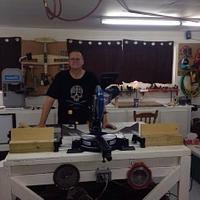43 Replies
That covers it up pretty well Jim.
If someone were to ask me that question, my initial response would be “are you nut?”
Just looking at what folks sell on etsy and the price they sell it at, I think it’s a loosing business.
Catering to the custom made crowd still has some money to be made but like you pointed out it takes time to develop that kind of business.
Abbas, Castro Valley, CA
For me woodworking is a hobby . A very relaxing , enjoyable hobby . Just me and the project , music from the 70 s , no hurry , no dead lines , when it’s done , it’s done . Trying to come up with a unique idea .
Wheaties
Very well written and thought out piece Jim, thank you. I have come to realize that selling my work takes a lot of enjoyment out of doing it because of deadlines, the insurance and trying to get a fair price for the customer and myself. I find much more joy in giving something to a friend or a family member than selling it. So as of today woodworking has become a hobby again and I feel really relieved. Thank you.
Jack
woodworking is a art if you love working you never work a day in your life I have made about everything there are in wood to make I make furniture crafts made money its in your blood .jim do what your heart feels you are the one who knows what you can do
jim
I have been working in wood all my adult life for my living, working in custom cabinet and wooden boatbuilding shops. It has not been the easiest road to travel on, but has been very satisfying. I opened my own studio 8 yrs ago and it is indeed the hardest thing I have ever tried. I believe in chasing your dreams but be determined and beprepared for hard work. Great topic Jim
Thanks gang for your input .
Yes Lanwater
it does seem many folks that sell products on places like etsy seem to have products that have a very minimal profit.
Bruce
even though I have a decent shop and a customer base I many times long for the fun of woodworking as a hobby. In the future, I’m sure I’ll be able to spend more time on projects I’d like to make.
Thanks Jack
we all have to evaluate whether or not woodworking as a business works for us. My post was not meant to discourage those in the business or even those considering woodworking as a living,but just to point things to ponder if you want to take the plunge . If you think it’s time to just be a hobbyist enjoy.
Yes Jim
you have made a vast and wonderful array of projects ,I’ve really enjoyed viewing many of them.
Plansandrails
I think you have used a few of terms a person in the WW business should think about,being very satisfying , knowing it may not be the an easy thing to do ,chasing your dreams and being determined and prepared.
woodworking classes, custom furniture maker
Good post. Wood-working is now a hobby,and will stay that way.
Madts.
Tor and Odin are the greatest of gods.
Thank you for your wonderful insight in your own experiences. Well written Jim. If I could I would like to add a few things… In any business venture a person must answer a few key questions before starting that will help make informed decisions. Have you done market research until you have exhausted every single angle to properly estimate revenue. As with any five year business plan, how much do expect to pay out with no income for a full two years. This must include a lot of normally hidden costs. Like a donation to a local charity that may provide some hidden marketing. It also has to include every known expense and account for increases every year, nothing goes down in price but their is always increases even in the water bill. A good business plan takes at least a month to research, at the end of which you should be able to determine if this venture will allow you to carry forward as a full time job, or maybe just part time for a period of time. I have made a half dozen business plans for people over the years, everything from hairdressing, to hotel ownership. Any way you proceed you must consider yourself an artist that is trying to make a business doing something you love. For some just breaking even is reward enough. For the majority of us we do it as a hobby with a few tools being paid for among the way and loving every minute. Having done it both ways I can say each has its own challenges and rewards. I wish anyone willing to try the best of luck, and remind them to do the research as it will answer questions without going thru complications.
CHRIS, Charlottetown PEI Canada. Anytime you can repurpose, reuse, or recycle, everyone wins!
Thanks Mads Enjoy!
Very good information and suggestions Thorreain thank you for the adding some great ideas to help folks who may consider WW as profession or even those who are currently engaged in the WW business.
woodworking classes, custom furniture maker
Jim
What you said is very true and some good advice .
I have done wood working for many years and still love it but to make a living doing it will most likely be a struggle for many .
I have seen guys come and go over the years and it is always the same story of high expectations but not enough business knowledge leading to failure .
For me it’s a hobby now in retirement and I love it having fun and giving most of my projects away to deserving people and I get great satisfaction from that .
Klaus
Thanks Klaus
Your work pro or hobby is always top notch.
woodworking classes, custom furniture maker
More joy in giving to someone than being paid .
Wheaties
It is a joy to be able to give to others but those of us that are in this crazy occupation need to make a living too.
woodworking classes, custom furniture maker
Thanks for posting this Jim, I know from my own experience that skill and commitment alone won’t guarantee success as a cabinet maker. Without a market for what you can produce, I feel you are beating yourself up for nothing, and at the mercy of the economic climate.
I have a brother who has been what we call a joiner for nearly 25 years – making sash windows, stairs, doors etc, all items that can only be custom made. I think that’s the difference – there’s no one else to go to for that type of work,and he has a constant stream of work – whereas a fine dining table, freestanding wardrobe etc, anyone can jump in their car and take a Sunday afternoon looking at these things in different furniture stores and there’s choice and prices on display. It takes a very special client to not have that mindset of shopping around and unfortunately, in my experience at least, there simply weren’t enough people to go that route for me to sustain woodworking as a business.
Yes, it’s tremendously satisfying to design and make something for someone and know you did a good job and your client loves it, but all of that don’t pay the bills. I don’t mean to be down about it, because there are success stories, I can think of at least half a dozen on here and on the other place, and they deserve their success because they are exceptionally talented woodworkers. One thing that strikes me as I think about those people that come to mind is they all have their own, very distinct style. You can tell who made a piece just by looking at it – such as Dan Mosheim, Les Hastings, BentlyJ.
I’m fortunate enough to have a trade I was able to fall back on and look forward to when I can start making furniture again as a hobby or as I, or my family need it, without the pressure of trying to make it pay a decent, regular wage.
Doing the best I can with what I've got
All of your work I’ve ever seen Renners is top of the mark in my opinion.
woodworking classes, custom furniture maker
opps double post
woodworking classes, custom furniture maker
Good points all around Jim. I’ve been involved in woodworking and all the related trades for a while now (since about 1975) and can say from experience making a successful business out of it can be challenging. But that’s not to say it can’t be done. We formed our current business 2 years ago and are already seeing a profit. For me, all aspects of the business are enjoyable even the office work. We are also very fortunate in that we are able to do a considerable amount of custom one-off projects in addition to the usual production cabinetry.
For me, it has been important to keep expectations realistic and expenses within a strict budget. Thanks to a skilled partner/wife, we remain debt free which is critical. Unsupported debt will drown a company. Supported debt, leases or purchases of specific income producing equipment such as CNC’s, must be approached with caution and a very critical analysis.
This can and will be a fun gig if you keep everything in perspective.
Artisan Woodworks of Texas- www.awwtx.com
Great post Jim, and many insightful comments from others. I think that it is everyone’s dream to make their hobby into a job; after all, we start hobbies because we enjoy them, unlike many jobs which we do simply to pay the bills.
I think it would take a very unique and special set of circumstances to be a self-employed woodworker. Either you could live in a city with a large population of wealthy clients and you are able to produce unique/fashionable/sought after furniture, or the right combination of luck/skill and social exposure results in widespread acclaim and business. For every Nakashima, Boggs, Maloof and Krenov I’m sure there were equally talented woodworkers toiling away in obscurity.
Rob, Sault Ste. Marie, Ontario
That’s great that it’s working out for you Bill,keeping debt down and tight monitoring of whether you’re in the red or black is critical.
You have made Lots of good points Manitario Thanks for you valuable input.
woodworking classes, custom furniture maker
I heard about the complicated insurance requirement for shops Whitacrebespoke.
Much more complicated than a regular business and more expensive too due to the accidents liability involved.
Great input.
Abbas, Castro Valley, CA
Thanks for you input Whitacrebespoke you made lots of good points that the average person might not think of.
woodworking classes, custom furniture maker
Really great topic Jim. And thanks for your
outstanding coverage of it.
I really think that you could sell that to one of the Woodworking magazines as it is very well done!
I have managed Auto parts stores the last
15+ years, and always have to look out for
all the things that Can happen.
thanks Jim
Steve Tow
Thanks Steve managing any business is a challenge.
woodworking classes, custom furniture maker
I think one of the biggest challenges to making the transition is realizing that it’s no longer a hobby and now must be treated as a business. A huge mistake folks make is underestimating, or even ignoring, overhead. Once you begin making items for a profit, you have entered into another realm. General business liability insurance, licensing, zoning restrictions, and sales tax collection are just the tip of the iceberg. Even if you’re starting out in your garage, you have to consider things like increased utilities as a part of your overhead.
We spent two weeks talking to several different insurance agents about the level and types of general business liability insurance we needed. Product liability, general loss, equipment, and inventory were all factors. The type of product manufactured, how it’s delivered, and if we did installations all added to the price. And it became very apparent we won’t be building anything for the juvenile market, I couldn’t begin to pay those premiums.
I don’t regret making the transition. I did a lot of leg work before we opened the doors and have had few surprises. There are a lot of resources available to guide you.
Artisan Woodworks of Texas- www.awwtx.com
All very good points and research.Yes Bill sales tax(I forgot that one since there is none in my state) plus registering to collect sales tax,all of a businesses overhead,rent/morgage,utilities and yes insurance plus in some states and counties, contractors licences are required to install what you make,cabinets, and or built-ins and maybe a special certifications for commercial installations,of course contractors need a specific type of insurance .
Adding another area to think about is finishing,as a hobbyist you can wait days and maybe even weeks for your finish to dry but as a pro time is money and having projects sitting around waiting to dry takes up space,so learning about finishes that will dry quickly and that are durable is very important for a more productive operation. Reguarding finishing many governmental agencies will restrict what type of finish you use and how you apply it and perhaps even require a certified spray booth.
woodworking classes, custom furniture maker
Great points, guys. Yes, once you would go into a production type basis, you do
have to worry not only have to worry about a booth like Jim was stating but
also, if you have any employees, OSHA
comes into play in the US. Occupational and Safety and Health Administration.
they are a self perpetuating brand of the
government, that look out for the workers
of any bussiness. They run by the fines they levy on any bussiness. If
one person calls them, they also are bound by law to investigate your bussiness. I actually manage an Auto Body Paint and Body Supply store in St Cloud Mn. And work with several of the
Woodworking shops here.
They all are concerned about the VOCS
they put out, which essentially is the amount of chemicals that you put out to the environment.
They all have employees and paint Booths and must keep track of The paints and
clears, reducers anything they buy to finish, and use HVLP spray equipment. To
minimize the overspray of their finishes.
While it may seem overwhelming, it is not
bad, once you get to that point, but when all of our shops were getting to the point
where they were compliant, it was very costly for them, and most of this was during a downturn in the economy, it
was an overwhelming financial burden on
some.
Steve Tow
Lots of good points Steve
Sometimes even for someone that’s been in business for years and years it can seem over whelming,but you just have to approach each category one at a time when you’re in business.
woodworking classes, custom furniture maker
I like this thread alot. Keep it coming guys. Been there and done that in the sailmaking business. Running a business is all attention to detail. Detail = Money.
Madts.
Tor and Odin are the greatest of gods.
So very true, guys! This could be a real eye openerror for someone thinking about it.
I think the hobby is just the tip of the iceburg, as far as turning our hobby part
into a bussiness, and hats off to you, Jim and Mads for roughing it out, and you
making a bussiness out of it! You both
must have been very talented guys!
I’m not trying to cast doubt on whether anyone can start a business, but that they be informed, it isn’t as easy as it seems.
Steve Tow
The common mistake many small business owners make is related to money management.
You need to treat your business as if you are an employee of the business.
Pay yourself a reasonable salary. Don’t treat your “cash register” as an extension of your pocket.
By paying yourself a salary, you will accumulate extra funds for when business is slow. Don’t run to the dealership and buy that 4×4 when money is coming in.
beware of financing deal. They are attractive and they do free money to spend on other stuff. They are somewhat tax deductible and that make them attractive.
Tax deductible does not mean free. Do remember you still pay quite a bit from your pocket.One should not indulge in unneeded stuff.
Most importantly keep regular business hours. Your customers will have a feeling you are reliable. And yes, treat them the way you want to be treated.
Abbas, Castro Valley, CA
all our fellow woodworkers have good points and are right like I said before you know what you can do you can start out small and work your way up like I said fallow your heart
jim
Thanks Madts,lanwater and Jim
Here’s a really tough area to figure out when you go into the ww business,
What to charge for what you make. Many folks have lots of approaches,some want to charge just the cost of the material and a nominal profit equal or less than the cost of the material.In my opinion, this is not the way to make a living it’s the opposite, it’s a way to fail. Another person might say just charge what others are charging or a little less,taking that approach does not ensure you are making a profit.Then there are those who say to Just charge an hourly rate,this might work if you take more than your just your material and the hourly rate you want into account. This may or may or may not turn out to be profitable,why? because there are other expenses involved like some of things already mentioned ,such as ,rent,or a mortgage,the cost of utilities,the cost of insurance,employees wages and cost of and wear and tear on your tools and equipment and more. Given al lof these expenses how do you come up with a hourly rate that you know will be profitable ? The only way I know is to calculate the cost of doing business on a daily and hourly basis. This is your shop hourly expense rate,Then add in the cost of materials,including wood,glue,sand paper,finishes,finishing supplies. now you have your total cost.
At this point your informed as to what it cost you to make any particular project.
From this point shop owners make up their mind what to charge over and above
their acual cost,some multiply by two three and even four times ,depending on the project’s difficulty ,the client,work load and or how hungry the shop owner is.Many might say,what if the client won’t pay that much? The answer is passon the job,there’s no sence in working and not making a profit.
woodworking classes, custom furniture maker
your right good luck
jim
Selling! I have always said that you have to know your bottom line before figuring any price. Of course you need to know your material and labor costs along with your overhead to figure out the bottom line. After that, you have to charge market value plus whatever you think you can get for a project, regardless of the bottom line. Figuring your bottom line is how you know if you can do a job or not.
If that price doesn’t meet the bottom line, then you have to pass on it.
Never use material x ?? to figure a price. Material will always be different then the labor that goes into a project. Some projects will pay way more than 3 or 4 times material.
Here is one method (of many) that I used in the past to figure out how much to charge. (Keep in mind this was as a guide for just another check point)
I would factor in how much profit I thought I should make in a year. Then I would add that into my overhead to come up with a hourly or weekly amount. (Keep in mind that amount would be if you sold every (sellable) hour in the year. I would estimate that only about 75% of the year is sellable so I would factor that into my calculations.) After plugging those numbers in for a job and comparing them to how much your actually selling the job for, you can get a good idea if your on tract to meet your projected profit.
One more thing to consider in your bidding is job location. Mileage, gas, do you have to take everything up stairs, rent a lift? Rent a truck? Getting your project to the job site can have many obstacles that will cost you. Be sure to add for these things.
In my years of experience there is no solid method of what to charge. Your going to make more money on some jobs and less on others. You have to weigh that out considering on your situation at the time. My advise is to charge more when you can and sacrifice when you have to.
I also agree with Lanwater about keeping business hours. Not only from the customers perspective, but it forces you to put in your time and you learn how to seperate your business time from your private time.
Another IMPORTANT subject is Time Organization. You have to learn how to organize your time to be able to commit a certain amount of time to each and all of the different tasks you will be required to perform.
Figuring out how to do something you have never done is what makes a good challenge.
All good points Bentlyj,interesting way to do cost analysis,I don’t see why it would’nt work,maybe better than my approach. Good point about other expenses like rentals and gas cost. I agree with Lanwater too about regular hours,I’ve stop doing business with places that claim certain hours but they’re closed no matter when you get there. Another great subject “Time Organization”
woodworking classes, custom furniture maker
Like you, I’m sure, we have been doing this a long time and have a pretty good idea how much something should sell for.
I evaluate cost several different ways and usually take an average of all the numbers.
Look at the job and plug in a price off the top of your head at what you think it should sell for. Also try to think what it would cost if someone else was doing it.
Figure material, labor and overhead and get that number.
Break the project into different parts and plug in a price for each part and see where you come out at.
Figure a per foot price and see what it is.
I usually estimate my time going per day, or on bigger jobs, per week.
Plugging in numbers in all of these different ways will show you what numbers don’t look right and should let you zero in on where you need to be.
Of course, I take advantage of my clients wealth if possible, but not to the point where it’s criminal.
Always be fair for the service you provide. My reputation allows me to charge at the upper end of the scale because all of my work comes from referrals by satisfied clients. Learn a drawing program so you can show your client exactly what they are going to get. This alone will help sell a job.
A client will be glad to pay more when they have the confidence that the work is going to be top quality, including covering floors and cleaning the job site of your debris daily. Don’t ever let the client clean your mess.
Last of all, I think this is the most important thing to build you career.
Always be up front and honest with your clients, even when it’s not in your favor,
this will go a long way for your reputation.
Anyway these are some of the tips that have worked for me along my 35 years or so of being in business for myself.
Figuring out how to do something you have never done is what makes a good challenge.
More great input ,I feel much of what you say is truly the way I bid ,basely using a number of different routes to come up with the final number,I guess I’ve been doing this long enough I don’t really think about it,it’s just automatic. Yes I’ve got about 30 years in the WW business plus time in other businesses too. I too agree with being honest it pays in the long run even if it’s just for your own self-worth and respect. If the customer doesn’t want the truth then they deserve to do business with someone who will lie to them.
woodworking classes, custom furniture maker
Jim,
Thanks again for bringing up this subject!
I have truly enjoyed each and every word written by all participating.
I also have a bussiness tidbit for someone who wants to get into this bussiness, have
a very clean separate, showroom, even if it’s a smaller office space.
It’s a proven fact, that women control 74%
of discretionarry dollars in the household,
and if they walk into your shop, and it looks like a pig sty, most businesses lose that sale immediately 80% of the time!
Also, get invloved in your community, parades. Softball games, high school sports, especially high school sports, always are a safe way of spending dollars
to get your name out there in a start up
bussiness.
Steve Tow
steve is right jim go for it
jim
Thanks for your suggestions Steve, I agree with the idea of a show room,but It may only possible with the folks that have a lot bigger budget to start off.The idea of making contacts in the community is good and may be good to start with but after you start building you may be in the shop 12-16 hours a day,so unless you have a partner or spouse that can be the business promoter in the public it may be tough to do.All said and done I think the best advertisement for you business are great finished products that customers love and tell others.
It may be others starting a WW business will be capitalized far better than I was, but when I started things were very tight financially.
woodworking classes, custom furniture maker
I agree Jim, it does take capital, but is very important to a start up to know anything that may help them.
And your absolutely right, letting your work speak for itself, has to be the most
important factor, without that, one could
have all their “ducks in a row” but if the Woodworking was shabby, they would have nothing!
Thanks Jim!
Steve Tow
I’m really enjoying reading the responses to this great topic. I don’t ever plan to make ww my full time job, but it is really interesting to hear from those that do this as more than just a hobby.
Rob, Sault Ste. Marie, Ontario
Thanks Steve
Manitario I think we all learn from each other.
Whitacrebespoke That’s a very interesting pamphlet.
woodworking classes, custom furniture maker





















